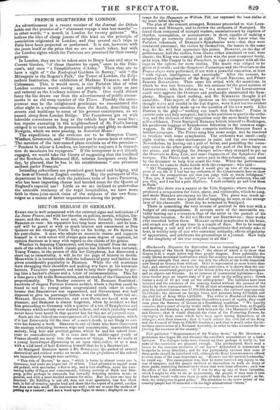Blackwood's Magazine for September has an interesting paper on " the
Bankruptcy of the Greek Kingdom ;" the object of which is to show that Greece is in a much better way than people suppose. Even politically, the really liberal municipal institutions which the country has secured are forming a popular strength that must one day defy the effects of the feeble despotism now forced on Greece from without. Otha is represented as more knave than fool; and, abetted as he has been by alien protectors, it is shown that the mo- ney which constituted great part of the Greek debts was lavished on foreigners and on objects not Grecian. As an instance of commercial legislation—Aus- trian timber pays an import-duty of 6 per cent on the selling-price; Greek timber a duty of 10 per cent on the selling-pricel The liabilities have been incurred and the resources of the country wasted without the consent of the Greeks by their representatives. W ith all that mismanagement, however, last year the national income was 17,834,000 drachmas ; the national expenses only 11,73:5,546; the interest on foreign loans and pensions being 4,703,232, and the civil list of King Otho 1,209,296. The writer in Blackwood thinks that if the Allied Powers would constitute themselves a court of equity, they could soon place the finances of Greece in a flourishing condition. " We humbly conceive, that a court of equity would strike out the Bavarian loan, as illegally contracted, and forming a private debt between the two Monarchs of Bavaria and Greece ; that it would diminish the claim of the Protecting Powers, by expunging all those sums which have been spent among themselves, or on strangers, with their consent ; that it would reduce the civil list of the King and the Council of State to 500,000 drachmas; and that it would order the im- mediate convocation of a National Assembly, in order to take measures for im- proving the revenues of the country."
Tait publishes "Reminiscences of Sir Walter Scott," by Mr. Morrison ; a gentleman who began life and obtained the novelist's acquaintance as a land- surveyor. The dialogue looks more dressed-up than perhaps it really is ; but some of the anecdotes are pleasant enough. The goodnatured Scott read a lesson to the common-enclosers of our day—" Abbotsford is intersected by footpaths in every direction ; and he was particularly anxious that none of these paths should be interfered with, although the Road Commissioners offered to close some of the least important up. 'Remove not the ancient landmarks,' he would say. The consequence was, that be never received any injury in the way of trespass; and the people declined of themselves to walk on many of these paths, restricting themselves to those that were least offensive ; such was the effect of his forbearance. 'If I was to stop up any of these footpaths, which I might be able to do as unnecessary, the people, if they took it into their heads, woald walk over them in spite of both the law and myself ; so far, then, my indulgence is good policy.' His attention to the lower orders of the country-people but ill accorded with his high aristocratical visions."


























 Previous page
Previous page